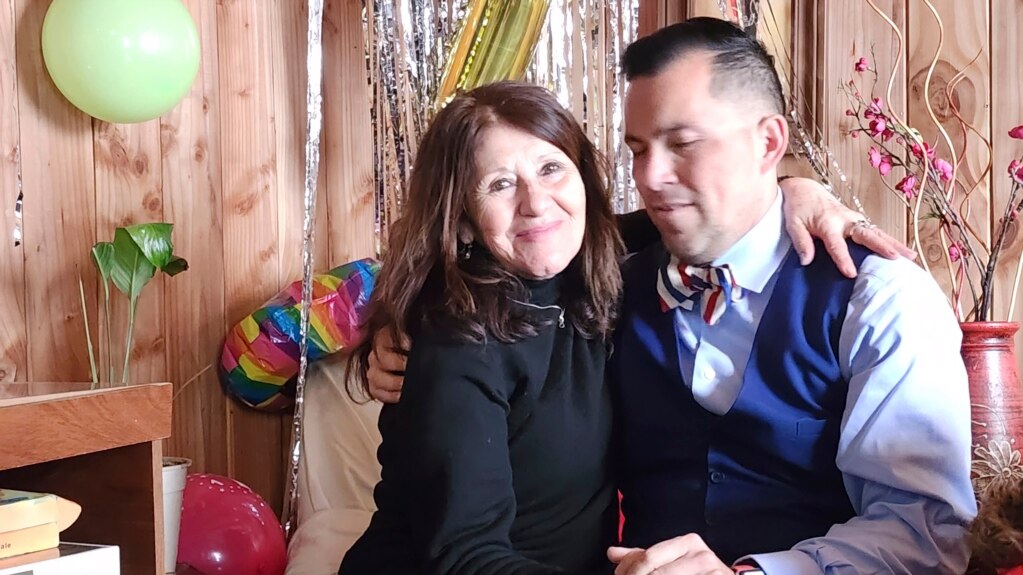Forty-two years ago, hospital workers took Maria Angelica Gonzalez’ son from her arms right after birth. Documents say they later told her he had died. Now, she was meeting him face-to-face at her home in Valdivia, Chile.
“I love you very much,” Jimmy Lippert Thyden told his mother in Spanish as they hugged and cried.
“It knocked the wind out of me,” Thyden told The Associated Press after the meeting.
His effort to find the birth family he never knew began in April. That was when he read news stories about adoptees who had been born in Chile and had been reunited with their birth relatives through a Chilean nonprofit group called Nos Buscamos.
The organization found that Thyden had been born prematurely at a hospital in Santiago, Chile's capital, and had been placed in an incubator. Gonzalez was told to leave the hospital, but when she returned to get her baby, she was told he had died and his body had been removed, documents say.
“The paperwork I have for my adoption tells me I have no living relatives. And I learned in the last few months that I have a mama and I have four brothers and a sister,” Thyden said. He now lives in Ashburn, Virginia, where he works as a criminal defense lawyer.
He said his was a case of “counterfeit adoption.”
The group Nos Buscamos estimates that tens of thousands of babies were taken from Chilean families in the 1970s and 1980s. That claim is based on a report from the Investigations Police of Chile, a civilian group, which examined the passports of Chilean children who left the country and never returned.
“The real story was these kids were stolen from poor families, poor women, that didn’t know how to defend themselves,” said Constanza del Rio, founder and director and Nos Buscamos.
The group said the disappearances took place during the rule of General Augusto Pinochet, who led the country for 17 years starting in 1973. Pinochet led a group which overthrew Marxist President Salvador Allende. Chile’s government says at least 3,095 people were killed during that time.
Over the past nine years, Nos Buscamos has organized reunions for more than 450 adoptees and their birth families, del Rio said. Other nonprofit groups are doing similar work, both in Chile and the U.S.
Nos Buscamos has been partnering for two years with the genealogy company MyHeritage. MyHeritage gives DNA testing kits for use at home at no cost to Chilean adoptees and suspected victims of child trafficking in Chile.
Thyden’s DNA test result said that he was 100 percent Chilean. It said he was related to another person who also uses MyHeritage. The website said the person was a first cousin.
Thyden sent the cousin his adoption documents, which included an address for his birth mother and a very common name in Chile: Maria Angelica Gonzalez. His cousin had a Maria Angelica Gonzalez on their mother’s side and helped him make the connection.
Thyden said his reunion with his birth family was a success. But, he knows that reunification might not go as well for other adoptees.
“It could have been a much worse story,” he said. “There are people who find out some really unfortunate details about their origin.”
While in Chile, Thyden and del Rio met with one of seven investigators working on thousands of counterfeit adoption cases like his own. Thyden also met with Juan Gabriel Valdes, the Chilean ambassador to the United States, to seek government recognition of the adoption scheme.
He said there was no way to assist Chilean adoptees in their efforts to visit their home country. Thyden said he sold a truck to pay for his family’s airplane tickets and other costs.
He said, “People need to be able to decide...what their name is going to be, where their citizenship is going to be…They should have all the rights and privileges of a Chilean citizen because this is a thing that happened to them, not that they chose.”
I’m Dan Novak.
And I'm Faith Pirlo.

